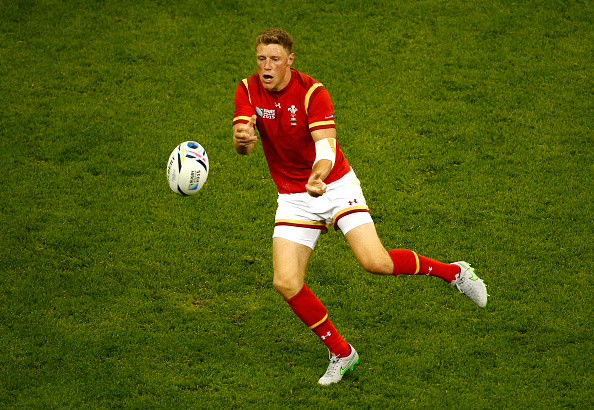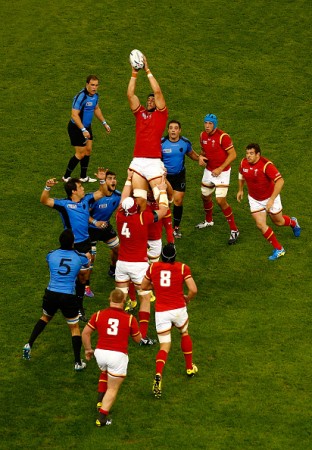Wales opened their World Cup with a 54-9 win over Uruguay on home turf in Cardiff, but does that count as a good start, or did the minuses outweigh the pluses?
When is a job done satisfactorily?
The difficulty with completing any job is that some people are never fully satisfied. Whether it’s a painter, gardener or rugby writer someone will always find a fault. The undercoat flashing through on a skirting board, a rogue weed, or in my case a lengthy list of typos.
Many will regard Wales’ 54-9 victory over Uruguay in the same manner. But it would be largely unjustified. As we have seen with Japan, Fiji, the USA and Canada, 100-point thrashings no longer exist. All ‘lower tier’ nations in the 2015 Rugby World Cup are able to compete for 40 minutes, the majority for 60 -70 minutes. Even the semi-professional teams such as Uruguay and Namibia are able to swig their halftime energy drink whilst being within 15-20 points of tier one nations. It is within this new world order that the Welsh victory should be judged.
Eight tries, total domination of possession and territory and a lineout that was so confident that Wales opted for 25 of them, completing each one thanks, in part, to the highly accurate throwing of Scott Baldwin. A glut of set piece ball meant that Rhys Priestland had the time to execute an effective kicking game and even had the chance to float a ‘miss four’ pass – rarely seen at Test level. The time and space afforded to Priestland delivered ball from which Scott Williams could glide over the gainline and gift Cory Allen a Test hat-trick – something to treasure indeed.
Whilst the result was largely reassuring, the injury list was vomit-inducing. Wales can ill afford to lose a centre, a loosehead, tighthead and a full-back. Thankfully Liam Williams’ injury affects his thigh, not his foot – which may be the only time in history that Welsh supporters have actually been happy to see a player injure their thigh.
Charteris is massive
Luke Charteris is huge. He has always been a physical presence and over recent seasons he has developed the effectiveness to match. His impact on the Welsh lineout is enormous. When chosen as the primary jumper his NBA-like height and reach are wonderfully reliable. Yet when he is used as a decoy he is even more effective, where his enormous levers can propel lighter jumpers, such as Sam Warburton and Justin Tipuric, into the flight path of small private jets.
But whilst his lineout work and tackling was exemplary against Uruguay, it’s his work at the maul that sets him apart. Charteris has arms like a monster from Sinbad and can wrap his arms around three or four attackers in a defensive maul – making the movement of the ball and changing the angle of attack tricky for the opposition. Charteris has to start alongside Alun Wyn Jones against England. End of.
Solid performance from Rhys Priestland
It was good to see Priestland put in a solid performance against Uruguay. A player who made his name at the 2011 Rugby World Cup seemingly finding his confidence four years later. It’s been a difficult few years for Priestland. Whereas Dan Biggar was once the marmite of Welsh rugby, Priestland became the pickled gherkin in the burger – something that most Welsh people instantly throw away.
Priestland is a player who thrives on confidence, and particularly his goal kicking, which was superb against Uruguay – kicking seven from eight conversions. Bolstered by that, the future Bath player executed a subtle blend of neat ‘end over end’ chip-kicks over the top of the Uruguayan blitz, low flat cross kicks, and a series of sublime passes – his gravity defying ‘miss four’ for Allen’s third try was a joy. There were obviously a few mistakes, but it is rare for an outside-half to have a perfect game due to the fact that that they touch the ball almost every other phase. Biggar may be Wales’s first choice, but Gatland also needs a second choice who is ready to perform when it matters. Priestland did that and should be congratulated.

Walking wounded: Cory Allen scored a hat-trick before tearing his hamstring. (Photo: Huw Evans Agency)
Centre problems
Rhys Webb and Leigh Halfpenny exited the Rugby World Cup in the cruellest of circumstances, but Cory Allen’s departure may have been even more tortuous. To be forced out with a torn hamstring after scoring a hat-trick is horrendous. Whilst the personal impact on Allen will obviously be enormous, it also leaves Wales with a massive problem in midfield.
Wales now only have Jamie Roberts and Scott Williams as first-choice centres – unless they consider George North a viable alternative at 13. The Welsh camp’s next move will be very interesting. They could opt for the untested youth of Tyler Morgan who has barely played any meaningful Test rugby, or possibly James Hook. The selection of a Test standard 12/13/15/10 over an untried, albeit promising talent, may seem an easy one. But we shall see.
Let’s also be clear, Wales are no longer building for the future, that time has passed. The future is next Saturday against England.
The danger of overly flat passes
Whilst Wales beat Uruguay without breaking stride, the devil of the flat pass once again reared its ugly interception-inducing head. Rugby Union’s reliance on rugby league style defensive alignment and speed has meant that the flat pass is necessary in order to give the receiver the greatest opportunity to get over the gainline.
However, against a semi-professional team like Uruguay that isn’t the case. Their defensive line speed was slow and the spacing porous. Passing the ball at bullet like speeds, with a tight spiral, along the tackle line seemed unnecessary against Uruguay and put undue pressure on the entire backline. Wales could quite easily have dropped five yards on their attacking line and given their players an extra second or two, to catch, scan and evaluate. This obviously wouldn’t work against England or Australia – but against the semi-pros of Uruguay, it would.








